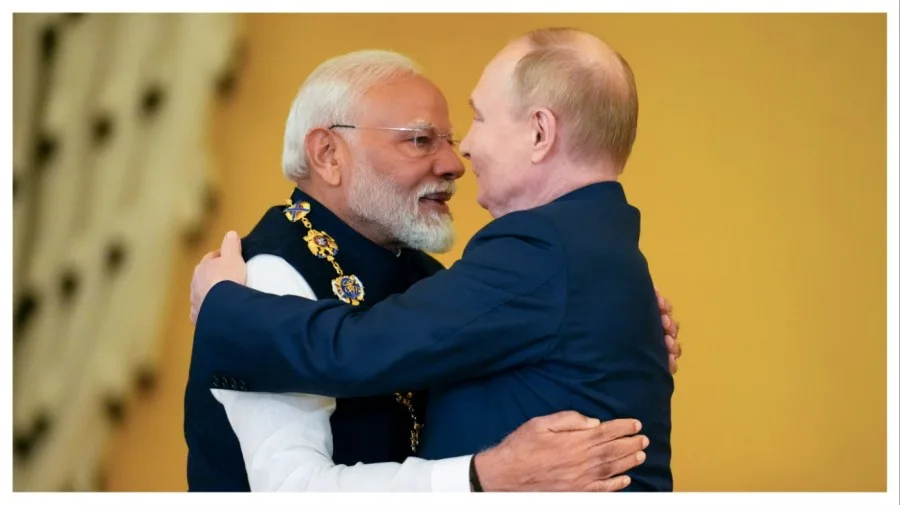The two-day visit of Prime Minister Narendra Modi to Russia coincides with the NATO summit gathering in Washington beginning 9 July. This gives an opportunity to both Russian President Vladimir Putin and India’s Prime Minister Modi to further their mutual geopolitical interests. Putin is desperate to project to the world that he is not as isolated as the US-led West would like the world to believe. Modi should also be anxious that Moscow is increasingly being pushed towards China seeking military and material aid from it. Tilting Putin a little is the least India can expect, given its increasingly hostile relations with China and its farcical policy of denial of Chinese aggression and occupation of Indian territories.
Putin welcomed Modi to Moscow by offering him tea, berries and sweets and took him on a tour of the grounds of his Dacha in the suburbs of Moscow in a motorised cart. Modi in turn posted photos of his arrival in Moscow on X, in both Russian and English, saying he was “looking forward to further deepening the Special and Privileged Strategic Partnership between our nations.”
The optics may seem to be to India’s advantage. However, Putin’s very recent visit to North Korea and his obvious bonhomie with Kim has not gone unnoticed by those observing the international arena in the present day world. Right from the start of the Russia-Ukraine war, India has been playing the role of seeming neutrality. It neither condemns the Russian invasion nor defends it, but harps on the theme of diplomatic and not military solution to the problem.
Accepting that there is no problem except a very simple Russian invasion that has been constantly killing civilians has resulted in distancing India from the public in the West. Governments may play friendly for short periods of time, keeping benefits in mind. It should however never be forgotten that public opinion eventually overrides all such diplomatic niceties. Such a stand of neither here nor there has, so far, proved beneficial to interests of a few Indian business houses dealing with petroleum imports that have not benefitted Indians but are diverted to Europe. This also helped Russia to sell its oil and circumvent the severe sanctions it is facing from the West. India has definitely not been the beneficiary in this whole affair.
With all this, the US seems not happy with India’s relationship with Russia and at the time Modi was meeting Putin 8 July, the State Department said Washington had raised concerns with India’s closeness to Russia amid Moscow’s invasion of Ukraine. The picture of Modi embracing Putin also came under fire from Ukraine President Zelenskyy who termed it as a “huge disappointment and a devastating blow to peace efforts to see the leader of the world’s largest democracy hug the world’s most bloody criminal in Moscow on such a day,” while posting photos of children killed and buildings destroyed by Russian rockets on X. All this destruction of Ukraine’s cities and killing of at least 37 people took place a few hours before Modi arrived in Moscow.
In a no-nonsense manner the US made it clear to India that any resolution of the conflict in Ukraine needs to be one that respects the UN Charter, Ukraine’s territorial integrity and Ukraine’s sovereignty.
Russia and India may have had strong ties that date back to the height of the Cold War. Undoubtedly the present world has completely changed and those heading India’s foreign policy need to understand that our democracy, economy and history make a unique combination in Asia, if not in the whole world. However there is serious doubt if anyone in the establishment is capable of understanding these finer details, much less creating a bipartisan strategy and implementing it. India will most likely muddle along, happy being in the middle and simply getting photographed at the G20. Sandwiched between cyber crooks in Cambodia, construction labour in Israel and support soldiers on the Ukraine front as well as attempted immigration all over the world, we might be frittering away our demographic dividend and trying to flaunt the Indian diaspora that consists of people who deserted this country when it needed them the most.
